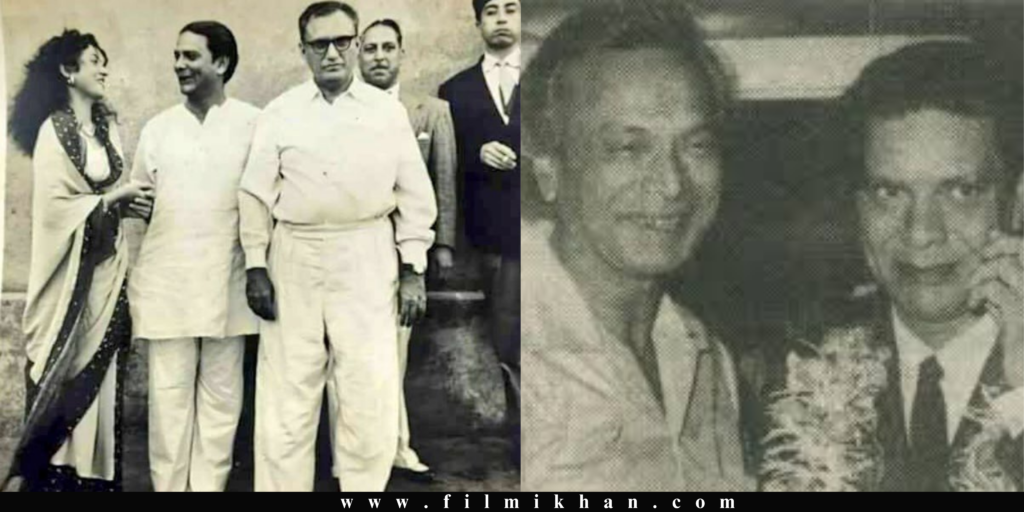
Shakeel Badayuni was a renowned Indian lyricist whose poetic genius left an indelible mark on the golden era of Bollywood. He was born on August 3, 1916 in Badayun, Uttar Pradesh. Shakeel’s journey into the world of words began at an early age. His innate talent for Urdu poetry blossomed as he immersed himself in the rich literary traditions of his culture.
In the 1940s, Shakeel Badayuni ventured into the Hindi film industry, where his lyrical brilliance quickly gained recognition. He collaborated with music directors like Naushad, composing timeless melodies that resonated with audiences across generations. His ability to infuse depth and emotion into his lyrics elevated the impact of every song he penned.
In Mumbai he met noted film producer and director A. R. Kardar. Kardar Sahab impressed with his poetic skills and introduced him music composer Naushad Ali who asked him to sum up his skills in one line. Then Shakeel Badayuni wrote, Hum Dard Ka Afsana Duniya Ko Suna Denge, Har Dil Mein Mohabbat Ki Ek Aag Laga Denge. Nausahd Immediately hired him for Kardar’s film, Dard (1947). The songs of films became very popular especially Uma Devi (Tun Tun)’s Afsana Likh Rahi Hoon Dil-E-Beqarar Ka.
After the success of Dard, Naushad and Shakeel Badayuni became sought after music composer and lyricist duos in the film industry. This duo churned out together films like Dulari (1949), Deedar (1951), Baiju Bawra (1952), Shabab (1954), Mother India (1957), Mughal-e-Azam (1960), Ganga Jamuna (1961) and Mere Mahboob (1963).
Although Shakeel Badayuni and Naushad combo was very famous but Shakeel collaborated with other composers too like Ravi and Hemant Kumar. His lyrics for the song Husnwale Tera Jawab Nahin and Ravi’s music score both won Filmfare Awards for the hit film Gharana.
His other notable film with Ravi is Chaudhvin Ka Chand (1960), Gharana (1961), Ghunghat, Grahasti (1963), Nartaki (1963), as well as Phool Aur Patthar and Do Badan (both released in 1966), while Sahib Bibi Aur Ghulam (1962) and Bees Saal Bad (1962) are his biggest hit with Hemant Kumar. The title song from Chaudhvin Ka Chand, rendered by Mohammed Rafi, won Badayuni the Filmfare Award for Best Lyricist in 1961. His partnership with legendary playback singer Mohammed Rafi produced numerous classics that continue to captivate listeners worldwide.
Shakeel penned songs for around 89 films. In addition, he wrote many popular ghazals sung by Begum Akhtar, which are still sung by singers like Pankaj Udhas and many others.
The government of India had honoured him with the title Geet Kar-e-Azam.
Apart from his contributions to the film industry, Shakeel Badayuni was also a prolific poet whose verses reflected the complexities of human emotions. His poetry delved into themes of love, longing, and spirituality, earning him acclaim beyond the realm of cinema.
Despite facing personal challenges and health issues, Shakeel remained dedicated to his craft until his passing on April 20, 1970. His legacy endures through the timeless songs he gifted to Indian cinema, each lyric a testament to his enduring talent and profound insight into the human experience.
With his evocative verses and unmatched storytelling, Shakeel Badayuni continues to inspire generations of music lovers and remains an integral part of Bollywood’s cultural heritage.
His Best Songs:
Suhani Raat Dhal Chuki (Dulari)
Man Tarpat Hari Darshan Ko Aaj (Baiju Bawra)
O Duniya Ke Rakhwale (Baiju Bawra)
Madhuban Me Radhika Naache Re (Kohinoor)
Pyar Kiya To Darna Kya? (Mughal- E- Azam)
Chaudvin Ka Chand Ho (Chaudvin Ka Chand)
Dil Laga Kar Hum Ye Samjhe (Zindagi Aur Maut)
Ye Zindagi Ke Mele (Mela)
Hue Hum Jinke Liye (Deedar)
Maan mera Ehsaan (Aan)
Tere Koche Mein Armanoo (Dillagi)
Milte Hee Ankhain (Babul)
Mere Mehboob Tujhe Meri (Mere Mehboob) (1963)
Jane Bahaar Husn Tera Bemisaal Hai (Pyar Kiya To Darna Kya)
Ek Shahenshah Ne Banwa Ke Haseen Taj Mahal (Leader)
Koi Saagar Dil Ko (Dil Diya Dard Liya)
Beqarar Kar Ke Hume (Bees Saal Baad)
Lo Aa Gai Unki Yaad (Do Badan)
Na Jao Saiyaan (Sahib Bibi Aur Ghulaam)
Meri Baat Rahi Mere Man Me (Sahi Bibi Aur Ghulam)
Aaj Puraani Raahon Se (Aadmi)
Jab Dil Se Dil Takrata Hai (Sunghursh)
Ek Baar Zara Phir Kahe Do (Bin Baadal Barsaat)
Tumhe Paa Ke Hum Ne (Gehra Daag)
Zindagi Tu Jhoom Le Zara (Kaise Kahoon)
2 thoughts on “Shakeel Badayuni: The Legendary Lyricist Who Defined Bollywood’s Golden Era”